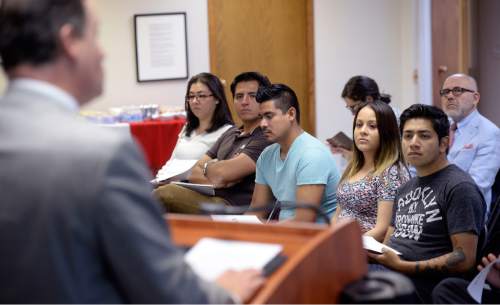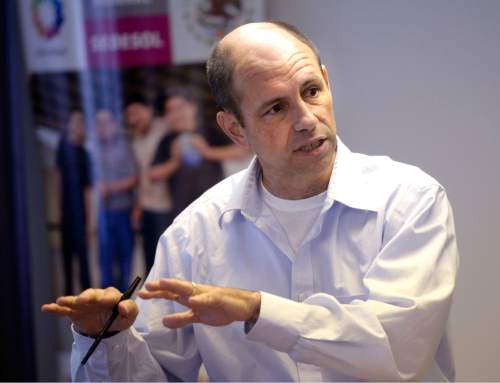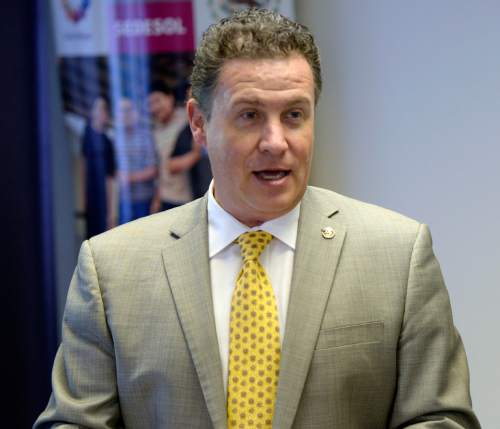This is an archived article that was published on sltrib.com in 2015, and information in the article may be outdated. It is provided only for personal research purposes and may not be reprinted.
David Morales, 23, long figured his future would not be the brightest because his parents brought him from Mexico to Utah without papers when he was 9 years old.
"I thought my life would be doing somebody's yard," he said, "or washing dishes or hard construction labor."
While nothing is wrong with such jobs, Morales said, being an undocumented immigrant blocked him from seeking more.
That changed three years ago when President Barack Obama issued executive orders blocking deportation of such undocumented immigrants who arrived as children, often called dreamers, through his Deferred Action for Childhood Arrivals (DACA).
Thanks to that initiative, "I'm studying to become a civil rights lawyer" in college, Morales said, something for which he once could not hope.
He was among the immigrants and civic leaders who celebrated the third anniversary of DACA on Monday at the Mexican Consulate in Salt Lake City. They also lamented the at-least temporary court blockage of other Obama orders to expand deportation protection and called for immigration reform.
For example, while Morales now has a Social Security number and can work without fear to raise money for his education, his undocumented-immigrant parents still live in the shadows. Obama had issued orders that would have protected such parents of citizens or legal residents, but courts have temporarily thwarted them.
"When we heard the announcement from President Obama, we all hugged each other. We cried because we were so happy to know that not only was I safe from deportation, so were my parents. Then later we heard the sad news," Morales said. "We're back in limbo. Even though I have protection, my parents do not. It breaks my heart and that's what scares me every day."
Christopher Patlan, 26, who was brought to the U.S. as a 6-month-old baby, said while he is now pursuing his dreams at the University of Utah in Asian studies — DACA even allowed him recently to travel legally to Japan and return for his studies— his undocumented-immigrant parents can only hope for such freedom themselves.
"There's kind of that key being waved in front of them, but they can't touch it," he said. "I'm going to college and learning a fourth language and doing all these things to improve my life, and they are just as capable."
Eduardo Arnal, Mexico's consul in Salt Lake City, said undocumented immigrants still wish for court approval of Obama's immigration orders, and he urges them to "continue collecting documents they may need to apply."
Marti Jones, director of immigration at Holy Cross Ministries, said she has faith "and good legal analysis" that courts will uphold Obama's plans, "and there are 43,000 people in Utah who will benefit" from expanded protection.
The Center for American Progress released a study Monday estimating that if Obama's expanded orders take effect, they could shield 55 percent of Utah's undocumented population from deportation.
The study also said that, during the next 10 years, the president's orders could help Utah's undocumented workers boost their earnings by $1.12 billion by making better-paying jobs available to them.
It also projects that the program could increase earnings of all Utahns by $1.35 billion because the undocumented would have more money to spend and help create an average of 330 more jobs a year.
Arnal said the blockage of some of Obama's orders last year may have confused people who were eligible for the earlier DACA program, which started three years ago. That initiative remains in effect and has not been stymied.
One of every two undocumented people in Utah who could qualify for DACA, Arnal said, "still have not applied."
Homeland Security Department data from the end of March show 8,468 people in Utah have been approved for DACA so far.
Arnal said most of them are from Mexico, and his consulate has worked to help them to apply.
Others called for Latinos to show how DACA has helped dreamers as part of a continuing push for reform.
"We urge community members to become active, to show the face of the undocumented," said Mayra Cedano of Comunidades Unidas, "and, more importantly, to keep fighting" for reform.







